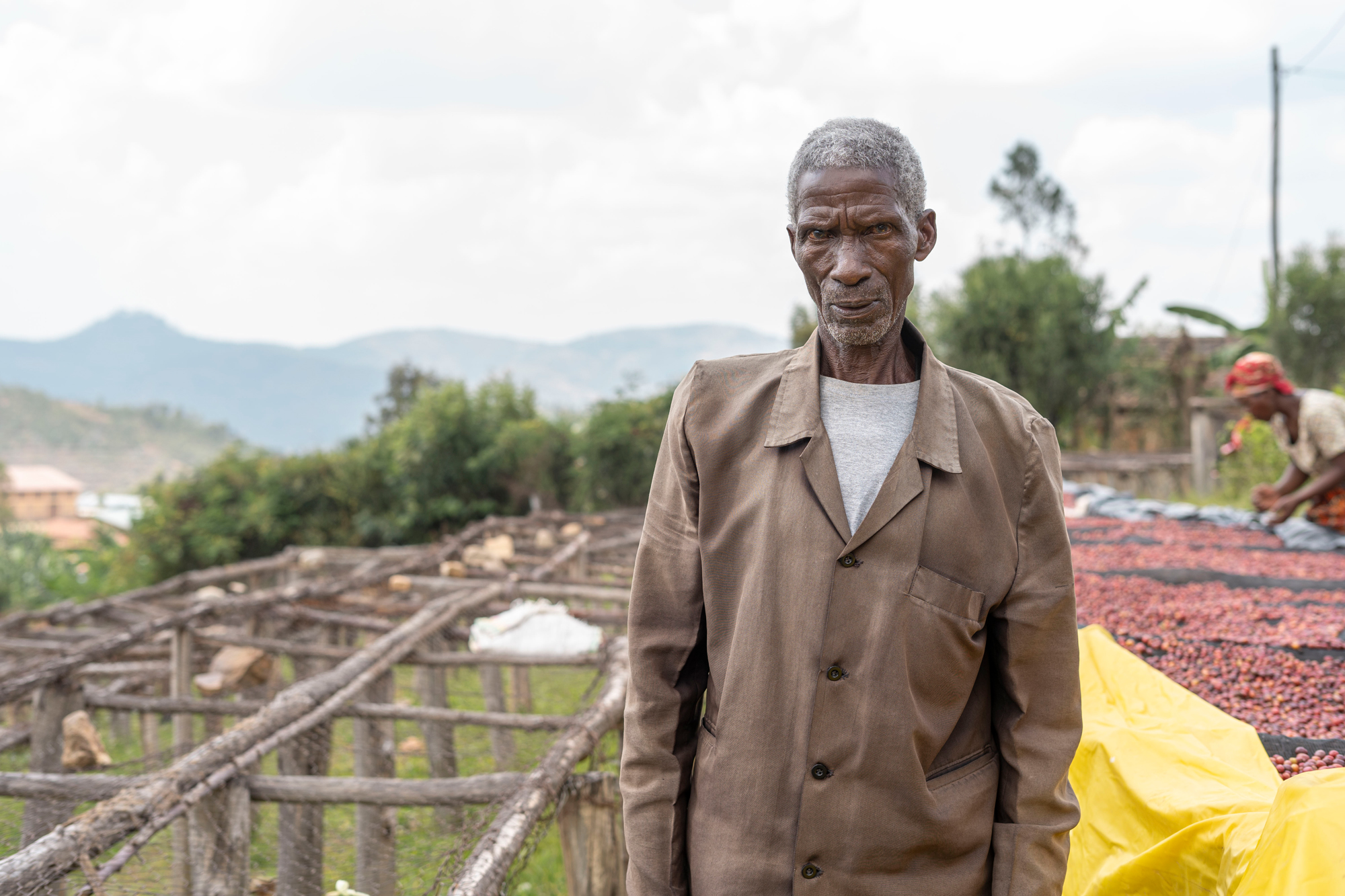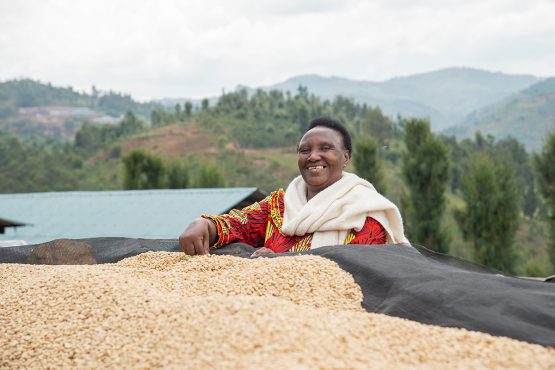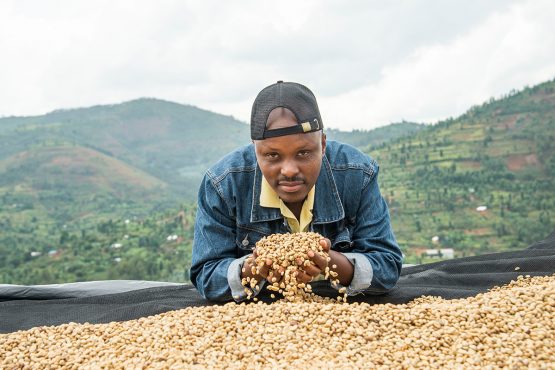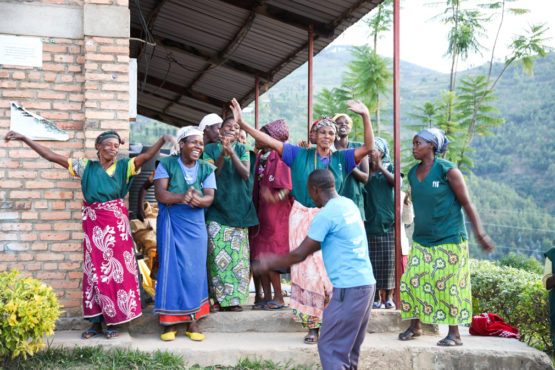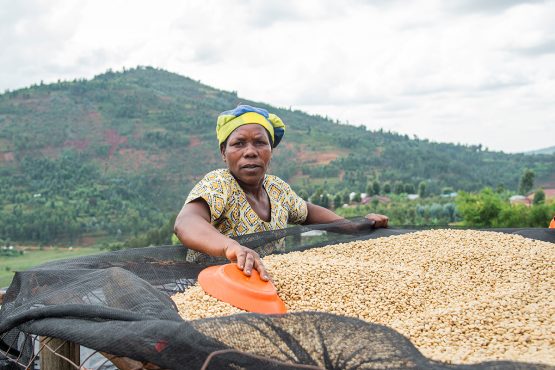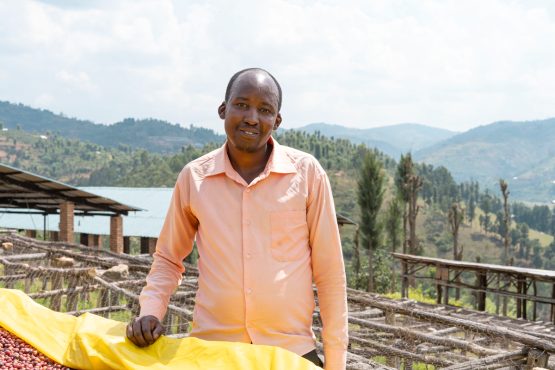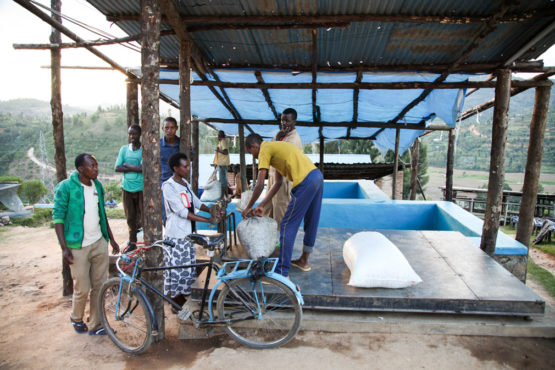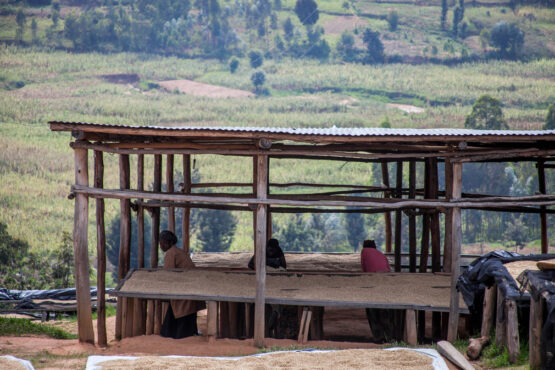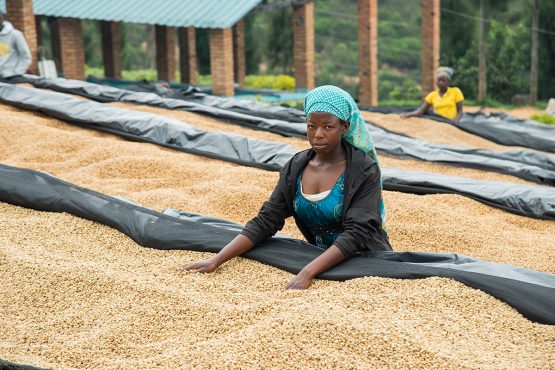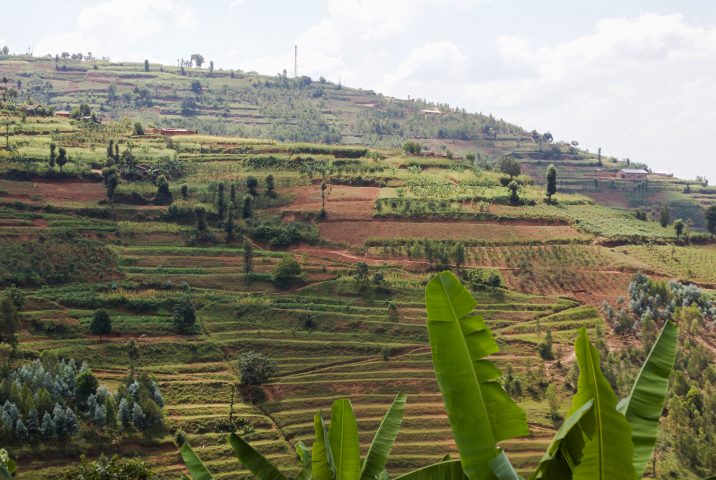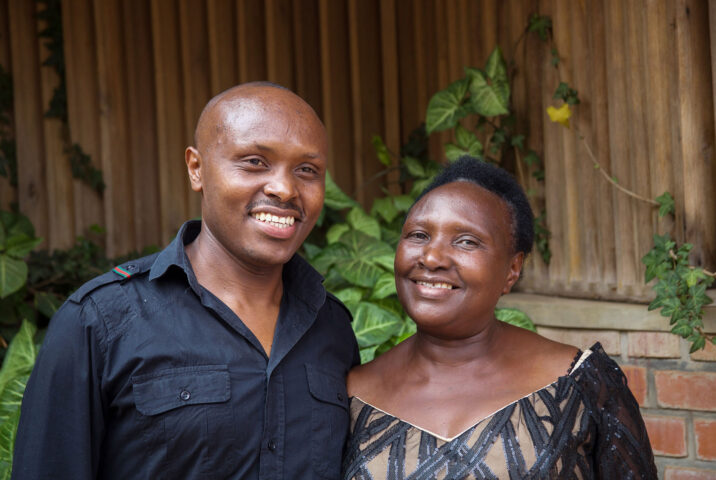Anastase Mudaherenwa
Distinct and elegant, with intense sweetness and a rich texture. Raspberry jam, mandarin and pecan pie.
It is extremely rare to be able to get a coffee that is traceable back to a single producer in Rwanda, so we feel extremely fortunate to be able to share this special lot from Anastase Mudaherenwa. With an impressive 5,200 coffee trees, across 15 plots of land, 81-year old Anastase is one of the largest estate holders in the area and has enough cherry to process sizeable day lots individually. Having inherited his first plot of coffee trees from his parents in his teens, Anastase has over 60 years of accumulated knowledge about coffee growing here, and has seen many changes in the industry.
When he first began producing coffee, cherries were arduously pulped by hand using stones, and growers sold dried parchment to anonymous brokers at very low prices. Today, Anastase delivers and sells his cherry to Buf Coffee, who own their own dry mill where they can process smaller lots individually, whilst minimising cost and maintaining excellent quality standards. With the addition of a dry mill to their infrastructure, Buf Coffee can now control quality from when coffee cherries are delivered to the washing station, all the way through to export. Thanks to these resources, Anastase can prosper as a coffee farmer, and his children and grandchildren see a future in specialty production.
Most of the coffees we source from Rwanda are traceable back to a washing station, or sometimes a farmer group. Single producer microlots like this one are extremely rare, as few producers in Rwanda have enough land or coffee trees to produce enough volume to build an exportable lot size. In this case, it is made possible due to the size of Anastase’s farm, which totals 1.05 hectares.
Most washing stations in Rwanda receive cherry from hundreds (and sometimes thousands) of farmers who own very small plots of land – on average less than a quarter hectare, with just 300-600 coffee trees. Separation of such tiny lots is expensive and impractical, so the large majority of coffees are processed as a mixed lot from multiple producers. Typically, lots are separated as day lots (ie. cherries that were all picked on the same day) rather than by a single farm or producer group.
Head here to learn more about the work of Buf Coffee in Rwanda.
ABOUT NYARUSIZA WASHING STATION
This coffee was processed at Nyarusiza washing station, which was established in 2003 and is the first Buf’s washing stations, servicing about 700 local producers. The washing station sits at 1,743 meters above sea level in the high, rugged mountains of Rwanda’s Southern Province. The area surrounding the washing station has mineral-rich soil and a lush environment that is well suited to specialty coffee production.
Quality control and day-to-day operations at Nyarusiza are overseen by the station manager, Jean Pierre Ayirwanda, who is assisted by Head of Quality Control, Eugenie Kanakuze. Together, they ensure that the coffee is harvested and processed with care and that production standards are kept at the highest possible level. Nyarusiza typically provides jobs for 60 seasonal workers during the peak harvest and staffs five permanent positions. At the end of each season, any surplus profits are shared with the producers and washing station managers.
Typically, farms in Nyamagabe District are very small – averaging around a hectare (or 300-600 trees) – and are situated between 1,800 to 2,000 meters above sea level. Coffee is grown as a cash crop, alongside subsistence food crops like maize, beans and sorghum and some livestock like goats and chickens. Cows are also an important asset to a farming family. Besides having practical advantages – like providing milk and yoghurt to feed the family, producing excellent manure for the coffee farms, and being an opportunity for additional income – they are also a traditional symbol of wealth and status in Rwanda.
HOW COFFEE IS PROCESSED AT NYARUSIZA WASHING STATION
- The ripe cherries are picked by hand and then delivered to the washing station either on foot, by bike, or by trucks that pick up cherries from various pick-up points in the area.
- Before being pulped, the cherries are deposited into flotation tanks, where a net is used to skim off the floaters (less dense, lower grade cherries). The heavier cherries are then pulped the same day using a mechanical pulper that divides the beans into three grades by weight.
- The beans (in parchment) are then dry-fermented (in a tank with no added water) overnight for 8–12 hours. They are then sorted again using grading channels; water is sent through the channels and the lighter (i.e. lower grade) beans are washed to the bottom, while the heavier cherries remain at the top of the channel.
- The wet parchment is then soaked in water for around 24 hours, before being moved to pre-drying beds where they are intensively sorted for around six hours. This step is always done while the beans are still damp because the green (unripe) beans are easier to see. It is also always done in the shade to protect the beans from direct sunlight (which they have found helps to keep the parchment intact and therefore protects the bean better).
- The sorted beans are finally moved onto raised African drying beds in the direct sun to dry slowly over 10–20 days. During this time the coffee is sorted carefully for defects and turned regularly to ensure the coffee dries evenly. It is also covered in the middle of the day when the sun is at its hottest.
- Once at 11–12% humidity, the coffee (still in its parchment) is stored in the washing station’s warehouse in carefully labelled lots until it is ready for export. The coffee is then sent to Buf’s brand new dry mill, Ubumwe (built 2017), to be dry-milled. Here the parchment is removed, and the beans are sorted again by hand and using machinery to remove any physical defects. This is done under the watchful eye of Edouine Mugisha, who has worked with Buf since 2011. Having control over the milling of the coffee means that Buf has greater control over the quality of sorting and processing from cherry delivery right through to export.
WHY WE LOVE IT
We have been working with Buf Coffee since 2009, and we feel privileged to work with such a dynamic, passionate, and committed family in Rwanda. This is our third year buying Anastase’s coffee, and we’re excited to keep supporting his work!
